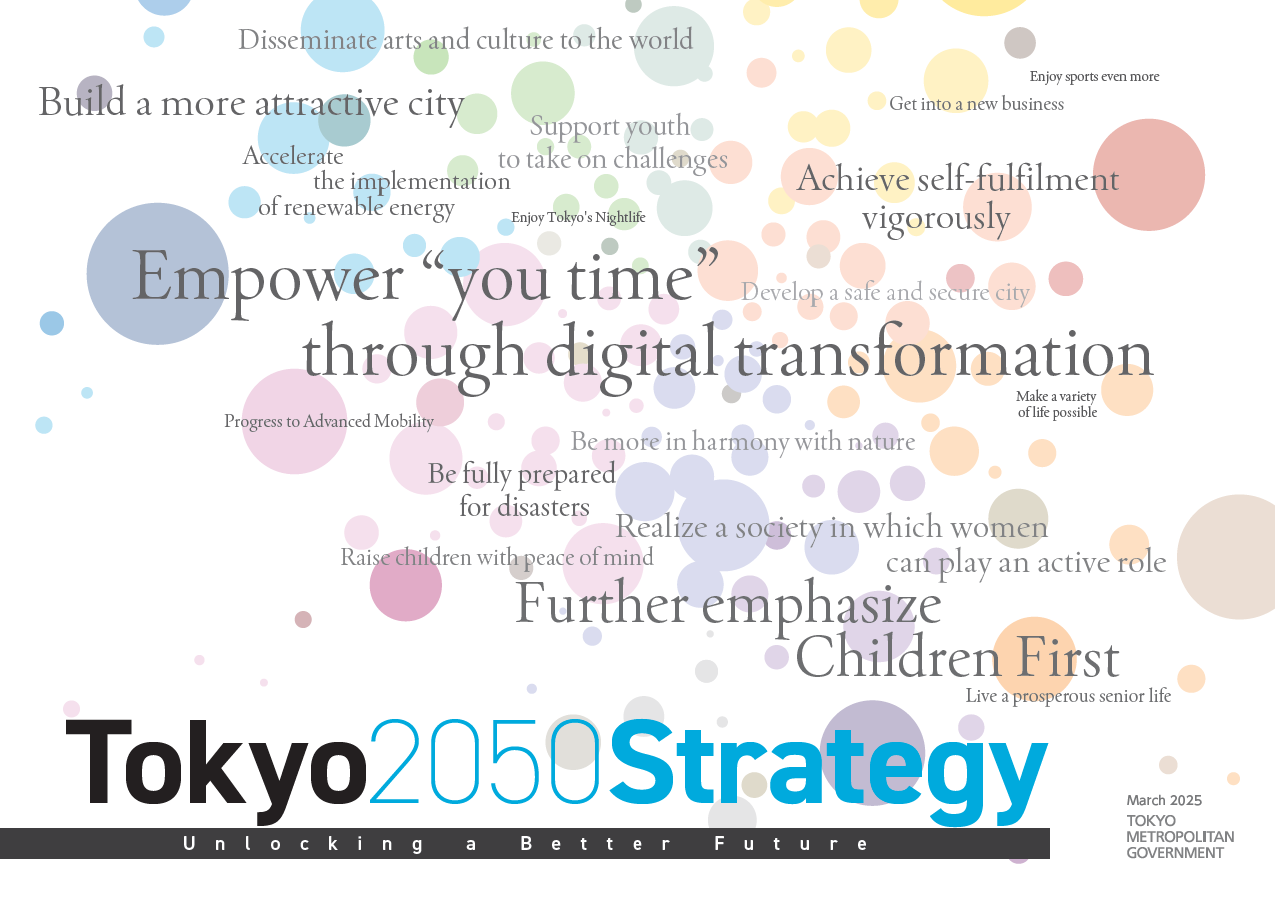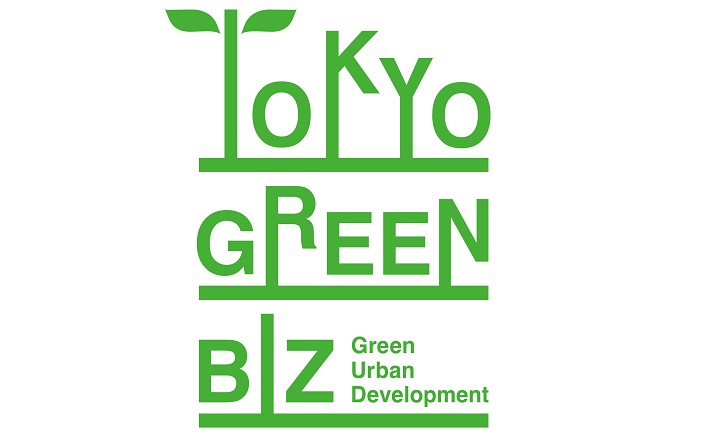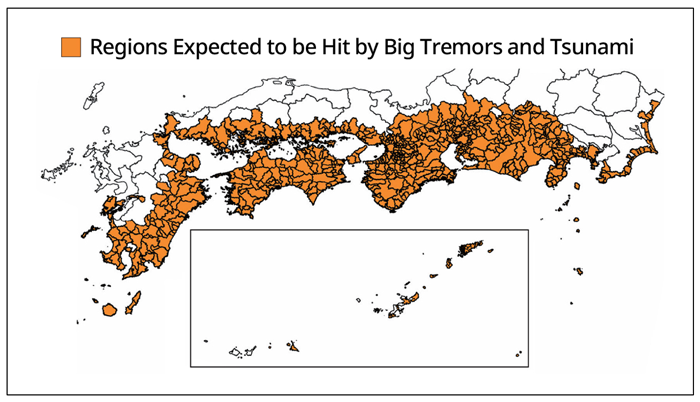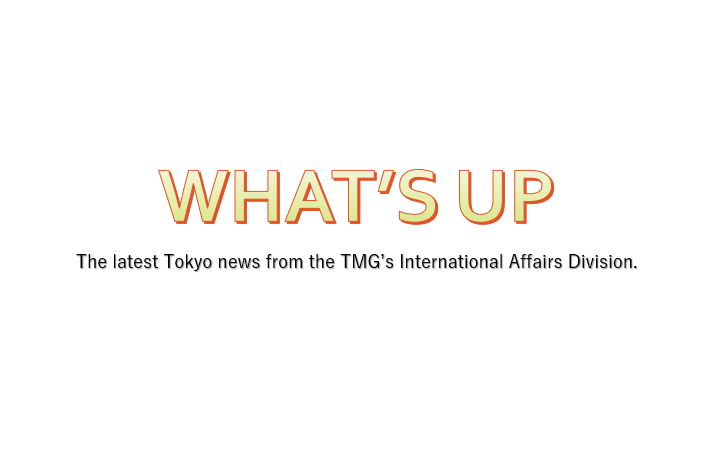Policy Speech by the Governor of Tokyo, Koike Yuriko, at the Fourth Regular Session of the Tokyo Metropolitan Assembly, 2023
In opening the fourth regular session of the Tokyo Metropolitan Assembly in 2023, I wish to relate my basic stance on future metropolitan administration.
Tokyo Metropolitan Assembly member Takashima Naoki passed away on October 2. I would like to extend my deep condolences to his family. May he rest in peace.
1. Foreword
The International Monetary Fund recently announced its prospects that Japan’s GDP will be overtaken by that of Germany and fall to fourth place in 2023. We must not forget that we are always in the midst of intense international competition. We are now at a crucial point in time where our level of commitment to reviving Japan’s economy is questioned.
We are acutely feeling the issues that Japan has put off addressing, such as the intensifying climate crisis, the declining birthrate and aging population, and the decline in global competitiveness. In these uncertain times, we must make our city one where the residents can hold hopes for the future and feel safe. On top of this, Tokyo must serve as the force driving Japan. To this end, Tokyo, from before, has been making pre-emptive moves to transform into a sustainable city. We will continue to move forward, one step, two steps at a time, while firmly maintaining this stance. Looking beyond the current age, while giving top priority to what best serves the people of Tokyo, we will devote our full resources to push forward policies that will pave the way to the future.
2. Drawing talent and investment to take the path to our next growth
In order to emerge victorious in the fierce competition with the other cities of the world, we must attract talent and investment by refining Tokyo’s strengths. We need to create a sustainable ecosystem in which growth leads to ongoing growth.
-
Taking Tokyo to new heights through innovation
Innovation is essential for solving the many challenges faced by cities and creating new value. And driving innovation is startups. In a recent contest for young entrepreneurs, most of the finalists were women. New perspectives and ideas are constantly emerging. At the pre-opening of Tokyo Innovation Base, a.k.a. TIB, last week, we welcomed key persons from Japan and overseas. The TIB will organically connect startup bases throughout the country, and then the world, to become a global hub that creates one big ecosystem with Tokyo at its core. Already, some 30 players from diverse fields including universities, accelerators, and large corporations, are participating as the starting members. In preparation for its full-scale opening next May, we will prepare a system to fully support young people and other motivated challengers in Japan and overseas, and generate an ecosystem on a par with those of the rest of the world.
The era is now one in which the technological capabilities of small and medium-sized enterprises are even paving the way to outer space. Centering on Tokyo Tama Mirai Messe (Tokyo Metropolitan Tama Business Activation Center) which opened last year, we will leverage the strengths of SMEs and create new businesses. Next month, the Tama Mirai Industry Fair, one of the largest exhibitions in the Tama area, will be held for the first time. We will encourage innovation by creating new connections between companies through facilitating their awareness of the excellent products and services that have been honed through enthusiasm and ingenuity.
Such evolving technologies will change society. For example, autonomous and flying cars are no longer a fantasy, but a realistic future that is almost within reach. We will draw a strategic roadmap and steadily advance the introduction of next-generation mobility.
Building an international business environment
It is also crucial to build an environment as an international financial center that attracts investment from Japan and abroad. To the national government, which aims to have Japan become a leading asset management center, we presented a 35-item policy recommendation. Items include having companies in Japan disclose their IR information in English and promoting active asset management by institutional investors. Through collaboration with the national government, we will fully demonstrate Tokyo’s superiority in having one of the world's best business infrastructures, and make it the world’s city of choice.
Digital transformation of resident services
The digital transformation (DX) of the metropolitan government will take its next step and digitalize resident services. What is important here is that everyone can sense that DX has improved the quality of service; in other words, achieved a transformation?the X of DX. We will gather the powers of the parties involved to deliver seamless services to the citizens of Tokyo. As one approach to open the way to transformation, together with the national government, municipalities and private organizations, we will promote "Children's DX" for society as a whole to support children and families raising children. By the end of fiscal 2025, we will realize a "outbound service for parenting” that delivers necessary information without waiting for such requests, and a "one-stop daycare center admission service" that allows the time-consuming procedures for enrolling children in daycare centers to be completed online. This month, we will launch the "Tokyo Children's DX 2025: Council for Promotion of Connected Parenting" and together with GovTech Tokyo, accelerate the implementation of services that can be rolled out nationwide.
-
An attraction only found at night
With inbound tourism recovering rapidly, now is the perfect time to have tourism boost economic growth. One of Japan's largest beach projection events, "CONCORDIA," has been underway in Odaiba since last month. It has received praise for providing a fantastical experience in light and sound through the use of cutting-edge technologies such as AI and AR. We will also have a countdown event on New Year's Eve at the Citizen’s Plaza, where there will be projection mapping on the curved wall of the Metropolitan Assembly Building and floating lanterns in the sky carrying New Year wishes. We will promote the appeal of Tokyo’s nights using light.
Making the most of Tokyo’s potential in agriculture
The diversity of Japan’s "food" is even attracting attention overseas. Securing a stable supply of fertilizer is a major issue in the cultivation of the crops that support Japan's rich food culture. We will engage in a project to extract phosphorus from sewage sludge at water reclamation centers for effective utilization as fertilizer. Japan depends on imports for almost all of its phosphorus. If Tokyo, which accounts for 10% of Japan’s sewage treatment, embarks on the domestic production of fertilizer, this would have a huge impact on food security as well. An agreement will also be concluded with JA Zen-Noh (National Federation of Agricultural Cooperative Associations) for the joint promotion of initiatives to make Tokyo's phosphorus available for use throughout Japan.
-
SusHi Tech Tokyo 2024, to be held next spring, will serve as an opportunity to send a powerful message to the world about Tokyo’s various initiatives. In addition to inviting leaders from cities around the world, we are also inviting startups from Japan and abroad to take part in a startup pitch contest, one of the highlights of the event. By also holding programs such as one in which cutting-edge technologies are used to allow participants to experience the possibilities of future cities, we wish to use this as an opportunity to significantly raise Tokyo's presence and make it a city where various connections that lead to innovation are born one after another. We will also boost expectations toward SusHi Tech Tokyo 100 days before this event by using digital space to provide a virtual world where people can experience the appeal of Edo Tokyo's diverse culture and industry.
-
3. Pursuing the new urban value of sustainability
-
The twenty-first century is called the “century of cities.” In the face of the climate crisis threatening humanity, we must fulfill our responsibility as major consumers of energy. As part of the COP28 climate conference currently underway in the United Arab Emirates, a local climate action summit was held, bringing together city leaders from around the world. The gathering represented a truly historic step for the international community in confronting our shared crisis.
In light of these global trends, we must ensure that we achieve our goal of “carbon half” by halving carbon emissions by 2030 and continue onward to realize a “Zero Emission Tokyo.” When I attended the climate summit the other day, I strongly promoted the advanced energy measures of Tokyo and Japan, such as soon making it mandatory to install photovoltaic systems on newly built homes and developing perovskite solar cells. I also declared that Tokyo will triple its renewable energy capacity by 2030. Under the strong resolve to achieve the goal set forth in the Paris Agreement of limiting global warming to no more than 1.5℃, we are being called to unite, act, and deliver. We will take concrete actions for the sake of a sustainable future.
-
Leading the charge for hydrogen adoption
At COP28, I announced the plans of the Tokyo Metropolitan Government (TMG) to establish Japan’s first hydrogen exchange through a partnership with a world-leading institution promoting the production and use of hydrogen, as a way to lead the global charge for hydrogen energy adoption. We will also promote efforts to form alliances with overseas cities in order to build an international supply chain and advance developments in hydrogen technology. By generating supply and demand through initiatives closer to home, such as providing support for the introduction of fuel cell-powered garbage trucks by municipalities eager to decarbonize their services, we will stimulate the use of hydrogen, which is considered a trump card for decarbonization.
Leveraging Tokyo’s potentials for the implementation of renewable energy
The TMG will lead by example in promoting the implementation of renewable energy. Beginning next fiscal year, the Tokyo Sakura Tram, a streetcar line long beloved by the local community, will run on green electricity generated from hydropower. We will also expand the use of solar cell technology by introducing cars equipped with solar panels into the fleet of official TMG vehicles. Ahead of the launch of the Building Environmental Report System in FY2025, we established an award to recognize businesses taking efforts to promote the spread of eco-friendly buildings. Additionally, we will work to be the first in Japan to introduce the continuous use of next-generation aviation fuel, SAF (sustainable aviation fuel), produced from used cooking oil and other recycled materials on regular domestic flights. At a meeting of experts and other stakeholders last month, we received advice on energy management, including about demand response in which customers adjust their demand for power according to the amount of supply. Moving forward, we will further study energy measures to drive a structural transformation in Japan’s energy landscape.
Leveraging the power of finance for decarbonization
We made our first investment with our sustainable energy fund, which we established for purposes such as developing green energy hubs, in a project to establish a 30,000kW wind farm in Hokkaido. In order to achieve carbon neutrality, it is essential to effectively use the power of finance and encourage private sector-led endeavors. We also partnered with financial institutions to run a seminar for small and medium enterprises, which make up the majority of Tokyo’s businesses, with the aim to spread the perspective of sustainable business management. We will stimulate sustainable finance efforts and make a strong push toward decarbonization.
-
With harmony between the natural environment and urban functions being highly valued worldwide, urban development has reached a major turning point. We will build a city brimming with greenery where people can relax and enjoy walking; one espousing the importance of “everyday life” and “comfort” that we can feel proud to pass down to generations a century from now. For example, in the Nishi-shinjuku area, we partnered with the municipal government and local companies to create a people-centric walkable space integrating the entire area, including roads and parks, which allowed many people to experience the appeal of our vision of urban development under a clear blue sky. Furthermore, we renovated Meiji Park, located adjacent to the Japan National Stadium, to feature new spaces where people of all generations can relax, including a spacious lawn plaza where anyone can spend time however they wish. We will also carefully cultivate a vibrant forest from trees planted by children and other local residents.
From Toranomon and Azabudai to Nihombashi and Shinagawa, large-scale redevelopment projects are underway across all of central Tokyo. We will protect, increase, and connect the greenery that flourishes throughout our city. For example, in the recently opened Azabudai Hills, flowers and trees that change with the four seasons cover the entire complex, creating a relaxing space that feels unexpected for an urban center. Urban development is giving rise to vast amounts of new green spaces. Moving forward, we will strengthen our policies while thoroughly incorporating the opinions of experts and the youth who hold the future of Tokyo in their hands, as we work to bring our Tokyo Green Biz project to the next stage.
4. Raising the next generation to realize a mature society where everyone can always shine
Next, I would like to speak about initiatives that will contribute to the development of “the people” to realize a truly mature city where everyone can always shine.
-
Rising costs brought on by factors such as overseas conflicts and a weak yen are impacting the lives of Tokyo residents. Amid such social and economic circumstances, we must firmly protect Tokyo’s economy and the livelihoods of its citizens.
In addition to measures implemented thus far to combat soaring energy costs, among others, we will swiftly take steps to support the people and businesses of Tokyo affected by rising prices, including implementing new measures to support the livelihoods of Tokyo residents and boost consumption. Moving forward, we will propose a supplementary budget proposal that contains such measures.
-
Promoting a “children first” standpoint is indeed a key component to supporting a city’s sustainability. We must create a society where children are the main actors.
Devoting all efforts to support households raising children
In today’s environment for raising children, families harbor a variety of worries, including uncertainty about the future. We will strongly urge the national government to fulfill its responsibility with respect to expanding and strengthening support for households raising children, and achieve this at the earliest possible time. At the same time, Tokyo will lead the way by taking bold steps to address education costs?an especially heavy burden on households?specifically, making high school tuition effectively free of charge and reducing school lunch fees. In this way we will do all that we can to support those raising children, and do so with a sense of speed.
Support for child-rearing
The first payments under the 018 Support program, which provides support to each child 0 to 18 years of age, will finally be distributed next month. And, next fiscal year, a new tuition exemption system at metropolitan universities will also be launched to prepare an environment that enables families to raise children with peace of mind.
We will respond to students’ motivation to learn more and desire to improve their skills, and support the growth of their talents and abilities. Through a program for first year Tokyo metropolitan high school students that commenced last month, we are providing students with occasions to deepen their learning, including opportunities to attend lectures and receive special instruction given by university educators active on the forefront of various areas of the arts. Utilizing such programs, we will stimulate the young sensibilities of students and nurture the next generation of talent. In addition, we recently organized the Teens Mobile App Contest, a competition among high school students in Tokyo for apps developed on the theme of solving common issues. Next month, we will present the awards to the winners and cultivate interest in programing, which continues to take on greater importance within society.
Meanwhile, the number of absentee children and students continues to rise. We must create an environment where children can learn with peace of mind and develop their potential. We will also continue to encourage the placement of support staff who provide academic guidance and consultations in designated rooms in schools to provide detailed support. Furthermore, we will steadily advance the establishment of an environment to facilitate diverse learning opportunities, including the utilization of virtual space online to create places where children feel like they belong and can engage in learning.
Protecting children who are suffering
Recently, issues of child sexual abuse have greatly shaken our country, reverberating around the world. Victims of sexual abuse and sexual violence are left with deep physical and emotional scars that can last a lifetime. Early response and support tailored to the individual subjected to abuse are essential. To make it easier for children and guardians to consult regarding such issues, we have set up a dedicated hotline. And, next month, we will also establish a desk that offers consultations via a social networking service. It is my hope that those who are suffering due to abuse will not hesitate to make use of these consultation services.
Amid the constant call for attention to the declining birthrate issue, cases of child abuse continue to rise. Cases of temporary custody lasting for extended periods, the growing need for mental health care, and other difficult issues characteristic of large cities are also becoming sharply apparent. Bolstering our child guidance system is an urgent matter. In addition to strengthening cooperation between the TMG and Tokyo municipalities, it is also necessary to enhance frontline, on-site response capabilities and utilize expertise to improve backup functions, as well as secure and cultivate human resources such as child welfare officers and child psychologists. From such perspectives, we will firmly build a system that enables us to fully protect our irreplaceable children.
-
Promoting measures for older citizens that support choju
The global population is aging. And, Tokyo is at the forefront of this demographic shift. Creating an environment with a view to realizing a choju (healthy and long-life) society is crucial. The Premium College that we established at Tokyo Metropolitan University to support the activities of older adults in the age of the 100-year life has been very well received. It is also necessary to consider the unavoidable challenge of dealing with an increase in dementia cases, which are expected to number approximately 7 million in 2025. Multifamily dwellings, where roughly two-thirds of Tokyo citizens live, are also home to a rising number of residents with dementia. To help improve response, we will dispatch experts to condominium management associations to provide advice on matters such as how to coordinate with relevant organizations. Recently, new drugs expected to be effective at delaying the progression of symptoms are emerging, and treatment options are expanding. Utilizing the knowledge of the Tokyo Metropolitan Institute for Geriatrics and Gerontology and others, we will advance comprehensive and systematic measures from a broad range of perspectives, including early diagnosis and treatment, to ensure that those affected can continue to live in their communities with peace of mind.
Empowering women
The percentage of women in management positions at companies in Tokyo has surpassed 10 percent, showing an upward trend. Despite this progress, the reality is that we continue to lag far behind the rest of the world. With respect to metropolitan affairs, we have already achieved the goal that we set forth in Future Tokyo: Tokyo's Long-Term Strategy to have the percentage of female members appointed to TMG deliberation panels and other bodies exceed 40 percent. The percentage has steadily increased to reach about 46 percent. In addition to these efforts, to accelerate the appointment of women to management positions at private companies, we will team up with company presidents to create a movement to promote women’s empowerment as a business strategy. Furthermore, through a site newly launched to disseminate information, we will work to prepare a more comfortable working environment for women by expanding understanding in the workplace concerning health issues specific to women.
Recent discussions held by the Tokyo Kurashikata Council, which considers workstyle and lifestyle related matters, once again made it clear that a multi-faceted approach to systems and attitudes within society is needed. We will continue to receive expert opinions and, as we do so, work to form policies to ensure that Tokyo does all that it can to create a society where women shine.
Achieving normalization
We will support individuals with disabilities in their pursuit of self-actualization. Working allows people to feel that they are participating in society. That is why we will again this fiscal year hold a popular, large-scale job-matching event for disabled individuals. Interviews with companies, lectures, seminars, and other events will be held simultaneously to contribute to broadening employment opportunities for those with disabilities, as well as shifting mindsets within society.
Additionally, we are currently advancing work to revise the basic plan on creating a city that is more accessible to all, including the disabled, with the aim to formulate the plan by the end of this fiscal year. We will make the plan an effective one that paves the way to a truly inclusive society where people from diverse backgrounds respect each other.
Measures to combat harassment of staff by customers
Cases of excessive demands and unreasonable claims by the public that demean employees on the receiving end, also known as “customer harassment,” are on the rise. Left unchecked, this issue could harm labor productivity and weaken the vitality of various industries. To address this matter, we are advancing the formulation of Tokyo’s own set of rules that will place equal importance on “customer satisfaction” and “the mental and physical health of workers.”
-
Preparations for the World Athletics Championships and the Deaflympics, which will both take place in Tokyo in 2025, are gearing up. Last month, the basic hosting plans for both events, which set forth the basic direction for operations, were formulated. With regard to the World Athletics Championships, along with preparing a stage that will allow the athletes to give their best performances, we also aim to make it a model for future international sports events that will focus even more on sustainability. In addition, there are now less than two years to go to the Deaflympics. Taking the opportunity presented by the Deaflympics, the TMG opened a special cafe for a limited time. Miru Cafe gives customers the opportunity to experience communicating with hearing impaired staff through the use of digital technologies. I also had the pleasure of visiting the cafe and was truly impressed with how smoothly everything went. We will bring together a diverse range of talent and skills to deliver the Deaflympics and make it the turning point for the establishment of universal communication through digital technologies. Furthermore, by creating opportunities for children to participate in both events from the planning stages, the experience gained will be firmly passed down to future generations as a legacy.
5. For a safe and secure city that strongly supports the activities of people
Nothing other than safety and security can fully draw out the power of “people” and support dynamic urban activities. We will thus bolster the three integral elements of self-support, mutual support, and public support.
-
First, self-support and mutual support. Many Tokyo residents live in condominiums and other such multifamily residences. Good progress is being made in the registration by such residences as facilities engaging in preparations to make it easier for their residents to shelter in place in the event of a disaster. We will sustain this momentum by actively informing them of the importance of implementing earthquake drills and building stockpiles, and work to further expand their numbers for better disaster preparedness.
We will also work to strengthen systems for resident activities at the onset of a disaster. The other day, we conducted a 24-hour on-the-ground earthquake simulation exercise for all areas under the jurisdiction of the Tokyo Fire Department. This helped to further strengthen collaboration with the municipalities and local fire brigades, and to enhance the fire and disaster preparedness of neighborhood associations.
Initiatives to bolster public support will also be promoted. This month we will revise the basic plan for measures against heavy rain. To ensure that our response can protect against most incidences of heavy rain forecasted to occur, the amount of rainfall targets to be cleared will be raised by 10 millimeters per hour throughout Tokyo. The plan will also include initiatives such as promoting the introduction of green infrastructure that assumes the occurrence of situations surpassing predictions, and while also taking into consideration what kinds of river facilities are required, we will build a city that will not succumb to storms and floods. The Umegaya Tunnel, which will connect Hinode Town and Ome City will finally open next March. This will vastly heighten the area’s disaster resilience by doubling road network routes.
With a Nankai Trough earthquake expected to occur in the near future, it is imperative that we work quickly to establish tsunami response in the islands. On the day before yesterday, a tsunami was observed at islands including Hachijojima and Kozushima. In the tsunami that hit in October, there were damages with small boats capsizing. Tokyo made an immediate request to the national government to strengthen systems such as for tsunami monitoring. We will steadily promote the building of a tsunami detection system now underway by a team centering on the Tokyo Metropolitan University. Furthermore, construction will begin at the start of the New Year in Toshima and Mikurajima islands for complete removal of utility poles to strengthen the disaster resilience of the islands.
The metropolitan government’s business continuity plan (BCP), which was formulated on the assumption of a major earthquake directly hitting Tokyo, underwent a major revision as “All Hazards: Step 1” to enable flexible response to a diverse range of disasters as well. In the near future, this will be further upgraded as a BCP for possible hazards such as an eruption of Mt. Fuji. This will further enhance the disaster response of the Tokyo Metropolitan Government, which serves the role of command center.
In order to prepare for ballistic missiles, which could be called our greatest threat, the first-ever evacuation drill in Tokyo using temporary evacuation facilities was held in Nerima-ku last month. The important points to protect your life in an emergency is to “get away, keep a distance, and take cover.” Along with regularly holding drills, we will strengthen activities to inform the public so that each citizen becomes more aware of the risk of missiles.
Based on such initiatives, we will upgrade the Tokyo Resilience Project within the year. In addition to heavy rainfall measures and disaster preparedness by multifamily residences, new initiatives such as response for volcanic ash from an eruption of Mt. Fuji will be added and more specific details for measures will be provided. By also clarifying medium-term targets for each measure, we will pave a sure path to a resilient and sustainable city that protects the lives and assets of its citizens.
6. In conclusion
As times continue to change, so too do the shapes of cities and the landscape of society. Looking back, we see that many of our predecessors used turning points in history, such as the Great Kanto Earthquake, World War II, and the 1964 Olympic Games, to transform Tokyo into a future-oriented and more prosperous city. With our economy and society currently undergoing major changes, now is precisely the time when we must learn from the approaches of those who came before us. This involves establishing harmony between nature and urban functions, driving a digital transformation, creating a new ecosystem conducive for innovation, and, most importantly, realizing a Tokyo where each and every citizen can shine. Our ability to bring our vision for a bright future to fruition is being tested once again. If we look at the current state of the world, it is clear there is no room for hesitation. A sea of infinite possibilities stretches out before us. Together, let us push forward with the Grand Reform of Tokyo with the unwavering conviction to put the residents of our city first.
Including the matters to which I have already referred, a total of 26 bills, including 8 ordinance bills and 6 proposed contracts, have been presented to this regular session of the Tokyo Metropolitan Assembly for deliberation among the Assembly members.
This concludes my speech to the Assembly. Thank you.
This article is also available in other languages.(日本語)







Recommended for You
Govenor Koike Calls for Innovation at FII PRIORITY Asia Summit 2025
December 1, 2025
Tokyo Governor’s Mideast Tour Highlights Multi-City Resilience Efforts and Japanese Capital’s Global Presence
November 27, 2025
Japan-U.S. Leadership Summit Held at UNU in Tokyo
October 10, 2025
TIME TO ACT FORUM 2025: Strategically Tackling Climate Change
October 7, 2025
Tokyo 2025 Deaflympics (Part 1): A Leap Towards an ‘Inclusive Society’ with Sign Language
November 12, 2025
Championing Inclusive Growth: OECD and Tokyo’s Shared Vision
November 13, 2025
Call to Action for Hydrogen Use at “HENCA Tokyo 2025”
October 21, 2025
Governor Koike Inspects Hachijojima Island Hit by Typhoons
October 15, 2025
Tokyo Disaster Response Headquarters Meeting (2nd Session)
October 9, 2025
Governor Koike Attends the Commendation Ceremony for the ‘Tokyo Eco Builders Award’ for FY2025
November 27, 2025